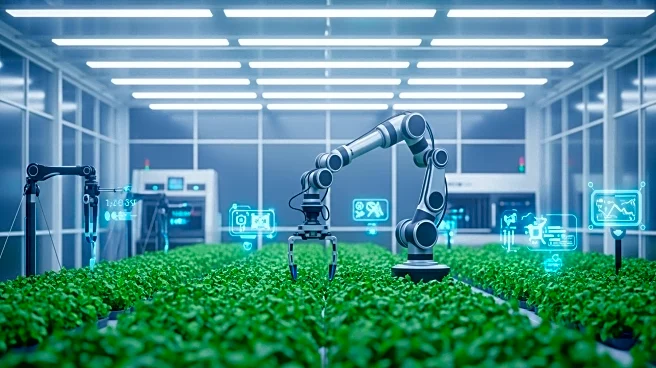What's Happening?
Matt Crisp, a veteran in the agtech industry, has highlighted the need for a strategic shift in investment approaches within the sector. Speaking at the World Agri-Tech summit, Crisp emphasized the importance of recalibrating expectations and focusing on smaller, more achievable returns rather than aiming for high-risk, high-reward outcomes. He noted that the agtech sector has not always delivered on its promises, prompting a need for more tactical and targeted investments. Crisp, who co-founded Benson Hill and recently launched Quercus Biosolutions, believes that artificial intelligence (AI) can play a crucial role in making the sector more attractive to investors by enabling faster and more efficient product development.
Why It's Important?
The agtech sector is at a critical juncture where traditional investment strategies may no longer be viable. Crisp's insights suggest a potential shift towards more sustainable and realistic investment models, which could stabilize the industry and attract new capital. This approach could benefit stakeholders across the agricultural value chain, including farmers, investors, and technology developers. By focusing on achievable returns and leveraging AI, the sector could see increased innovation and efficiency, ultimately contributing to more robust food systems and addressing chronic disease challenges linked to nutrition.
What's Next?
The agtech industry may see a rise in cross-asset class investments and collaborations with sectors like healthcare and insurance, as suggested by Crisp. This could lead to systemic changes in how food and health are interconnected, potentially driving significant investment from non-traditional sources. Additionally, the integration of AI and other technologies could redefine product development processes, making the sector more appealing to investors seeking lower capital input with higher return expectations.
Beyond the Headlines
Crisp's call for a recalibrated investment approach in agtech highlights broader implications for the industry, including ethical and cultural shifts towards sustainable agriculture and food systems. The potential involvement of insurance companies and other large stakeholders could lead to transformative changes in how agricultural products are developed and distributed, aligning with global health and sustainability goals.










